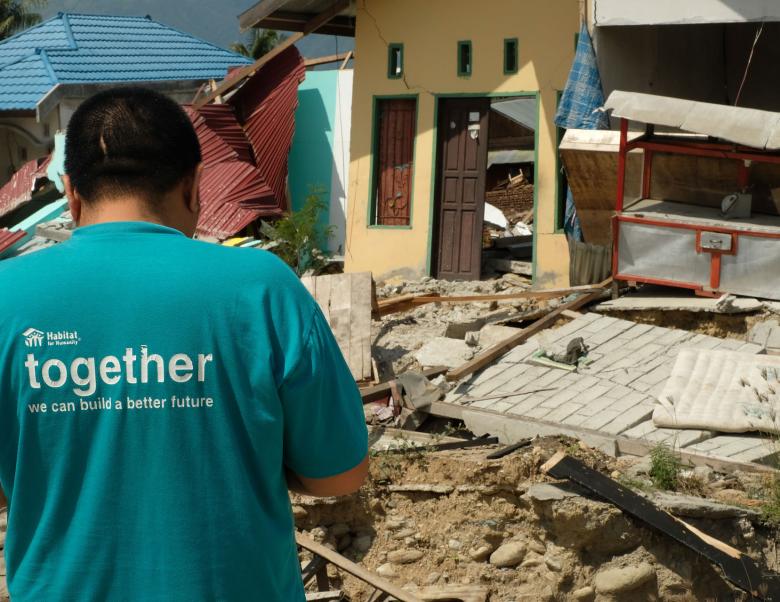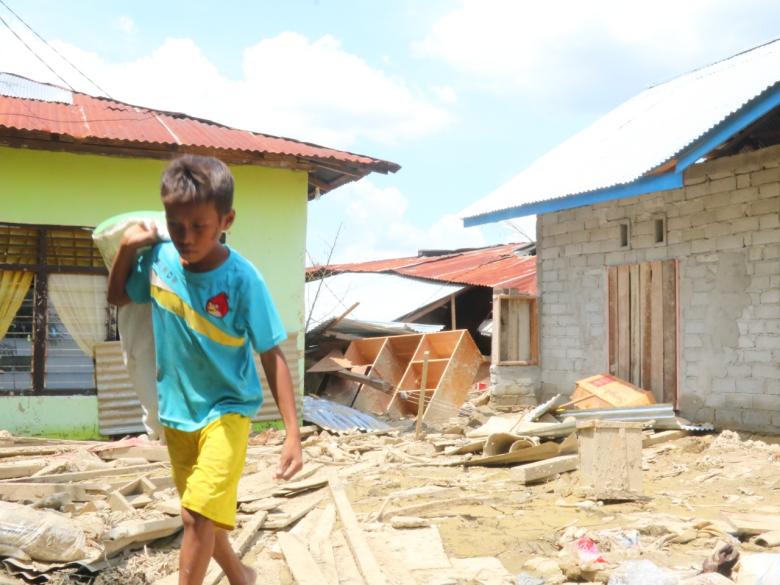Habitat for Humanity delivers statement at Global Platform for Disaster Risk Reduction
MANILA (May 29, 2022) – At the Seventh Session of the Global Platform for Disaster Risk Reduction convened by the United Nations Office for DRR, Habitat for Humanity Indonesia’s National Director Susanto Samsudin delivered the following statement on Habitat’s commitment to achieve the goals of the Sendai Framework for Disaster Risk Reduction 2015-2030 and other critical global agendas, including the 2030 Agenda for Sustainable Development and the New Urban Agenda. During the same conference, Andreas Hapsoro, Strategic Alliance Director of Habitat for Humanity Indonesia and Disaster Response Operations Specialist of Habitat for Humanity International, presented at the preparatory Stakeholder Forum: Plenary 1 “Lessons Learned in Building Resilience - Over the Past 3 Years” on May 23. Hapsoro also spoke at the side event: Global Youth Platform for DRR and Climate Action 2022 on May 25.

Statement to the Global Platform for Disaster Risk Reduction 2022
Habitat for Humanity International is pleased to submit a statement reiterating its commitment to ensure that all members of the global Habitat for Humanity network work together to achieve the goals of the Sendai Framework for Disaster Risk Reduction 2015-2030 and other critical global agendas, including the 2030 Agenda for Sustainable Development and the New Urban Agenda, among others. Habitat for Humanity affirms its commitment to contribute and engage with partners to continue our efforts in influencing these global agendas, as well as continuing our risk reduction work in local communities.
Habitat for Humanity International is driven by the vision of a world where everyone has a decent place to live. Today we are faced with an unprecedented global housing challenge, which is made worse by both the COVID-19 pandemic and the intensifying impacts of the climate crisis.
Habitat for Humanity International recognizes that vulnerable people, particularly those living in inadequate housing, are bearing the brunt of our changing climate. Families living in informal settlements in the Global South are often the most affected by the increasing frequency and intensity of climate-driven disasters. They are also the least able to build back because of limited resources and savings. Across the quickly urbanizing Global South, the number of people living in hazardous locations and inadequately built housing is expected to more than double to 3 billion over the next 15 years. Without immediate and appropriate solutions, growing numbers of climate-displaced populations will add to the complexity of the global need for adequate and affordable housing.

Habitat for Humanity’s commitments to the Sendai Framework for Disaster Risk Reduction
The overall theme of the Global Platform 2022, From Risk to Resilience: Towards Sustainable Development for All in a COVID-19 Transformed World is more important now than ever in defining outcomes and reaching the goals of the Sendai Framework for Disaster Risk Reduction. Equitable access to adequate housing is an essential input to achieving sustainable development across all communities. Housing deprivation is one of the greatest amplifiers of the impacts of disasters when they hit. A secure and adequate place to call home is the first line of defense against disaster, and an enabler for faster recovery.
Habitat for Humanity commits to the following actions in support of the implementation of the Sendai Framework through its shelter and housing programs and advocacy:
- Address disaster risk reduction in all shelter, housing and settlements programming with an emphasis on the causal and underlying factors of disasters by promoting interventions that address the exposure to hazards, reduce vulnerability of people and property, facilitate the wise management of land and the environment, improve preparedness for adverse events and promote adaptations to climate change.
- Work together with civil society organizations and local governments to build safer and more resilient communities, promoting a culture of preparedness and understanding that secure land tenure, affordable and resilient housing, safe water and sanitation are critical components to foster disaster risk reduction.
- Improve the internal capacity of local Habitat for Humanity affiliated entities and partners in order to promote inclusion and serve vulnerable populations, with a strong emphasis on urban areas given their exponential growth and high exposure to risk.
- Support disaster risk reduction and the building of resilience as a national and local priority, contributing to strong governance and participation of vulnerable populations in the decision-making process by fostering safe shelter and settlements awareness, strengthening local leadership and promoting gender balance.
Our Call to Governments and stakeholders to ensure disaster preparedness and response through housing
In our collective effort to achieve the Sendai Framework for Disaster Risk Reduction 2015-2030, Habitat for Humanity calls on governments recognize the following guiding principles for the development of policies that will drive their disaster preparedness and responses, with a focus on equitable access to adequate housing for vulnerable populations, by:
- Prioritizing resilience and adaptation, through improved access to adequate housing, of at-risk communities who bear the brunt of disaster impacts, ensuring building better and building back better are prioritized and intentional.
- Creating or reinforcing policies for disaster resilience and response which prioritize onsite reconstruction or upgrading over relocation.
- Ensuring empowered community participation is incorporated into the design of disaster risk reduction and response programs.
To support delivery of these guiding principles, Habitat for Humanity calls on all governments to implement the following actions:
- Identify disaster risks that will impact vulnerable communities, and effectively communicate those risks, ensuring that mitigation actions are inclusive of informal settlements.
- Increase national government funding for disaster risk reduction to mitigate the rising cost of humanitarian assistance and economic losses by the impacts of disasters, recognizing that investments in prevention far offset the costs of disaster response.
- Implement regulations that ensure security of tenure in addition to access to basic services, particularly for at risk populations, to safeguard continued access to safe land, incentivize investment to increase structural integrity and rebuilding without fear of eviction before or after a disaster, within a framework for sustainable development.
- Support community engagement at the local level by supporting local government officials to engage with stakeholders, applying community-based disaster risk reduction mechanisms and integrated approaches to improve the lives of vulnerable populations, develop capacity and raise awareness on shelter and settlements related risks.
- Develop voluntary, inclusive and gender-sensitive relocation guidelines that support the voluntary relocation of vulnerable communities and people displaced by climate change in locations where multiple hazards are life-threatening and cannot be adapted to at a reasonable cost.